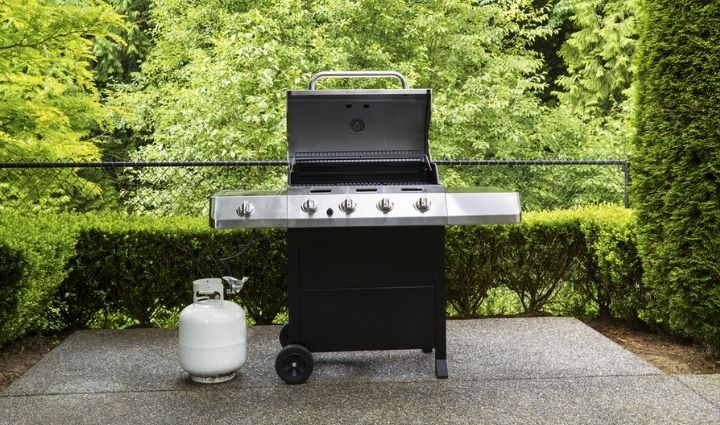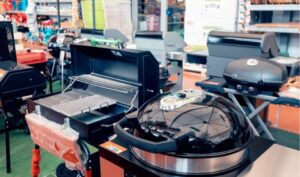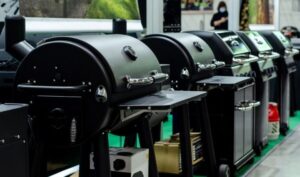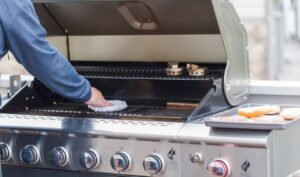This is Part 3 of GrillSpot’s Ultimate Gas Grill Buying Guide, where we’ll cover everything you need to know about how to buy a gas grill, from what factors you need to consider to detailed guides dedicated to everything from budget to grill size to BTUs.
Gas grills can be powered by two different types of gas: natural gas and propane. The grilling experience doesn’t differ too much between the two options, but they both offer benefits and drawbacks and you may have questions about grill performance and whether one option is better than the other.
In this section of the Ultimate Gas Grill Buying Guide, we will explore some of the most commonly asked questions about how natural gas and propane gas grills compare when to comes to:
- Taste
- Cost
- Temperature
We’ll also help you decide whether you should choose a natural gas or a propane grill.
Before we get started, let’s take a moment to review the key differences between propane and natural gas grills.
- Propane grills are powered by propane tanks or canisters, which can be purchased, exchanged, or refilled at various locations. If you have an in-ground propane tank, your grill can also be set up to draw from it, but this requires a special regulator.
- Natural gas grills draw gas from a natural gas line. You’ll need to already have a natural gas line installed, but you won’t have to worry about replacing tanks or running out of gas during a grilling session.
Let’s get cooking.
Natural Gas vs Propane Grills: Taste
Natural gas and propane are both odorless gases, but for safety reasons, both natural gas and propane gas providers add a smell so you can quickly tell if there is a gas leak. The smell dissipates when it is burned off, so both natural gas and propane are completely tasteless and will add no flavor to whatever they cook. You will not find a flavor difference between a hamburger (or steak, or potato, or anything ) cooked on a natural gas grill and an identical hamburger cooked on a propane gas grill.
Natural Gas vs Propane Grills: Cost
Comparing the cost of natural gas to propane gas can be a little challenging. The price of gas—no matter which type—varies as markets fluctuate, and, in different locations, the cost of natural gas may be higher than propane (or vice versa) due to availability.
With that in mind, let’s consider the various expenses each type of gas requires to get your grill running:
Natural Gas
There is a higher upfront cost for a natural gas grill if you do not already have a natural gas line installed. When factoring in labor and materials, a new gas line can cost anywhere from $15-$75 per linear foot. According to HomeAdvisor, this typically adds up to between $135-$387, but can sometimes go as high as $900. They pin the average cost for installation at $261, but it’s important to keep in mind that this does not include the price of the grill or the cost of regular use of natural gas. The cost of fuel depends on current market rate, but it is typically around $0.15-$0.75 per one hour of use.
Propane Gas
All you need to get a propane grill operational is a propane tank. You can expect to pay between $35-$50 for a 20 lb tank, which holds 4.6 gallons of propane. The price varies based on your location and current market rates but it typically costs between $3-$4 per gallon to refill. According to HomeAdvisor, you can expect to pay $1-$5 per hour of use for propane.
While natural gas may be the cheaper option in the long term, you should consider carefully which one is better for your specific situation. The cost of a gas grill varies based on the size and features you want included, but natural gas grills will require a longer hose to connect to the fuel line, which can increase the price. Propane may be the better option for you if you don’t own your home or aren’t planning to stay long term, or you want to avoid the high upfront cost of a natural gas grill setup or there are no natural gas lines in your area.
Propane vs Natural Gas Grills: Temperature
While propane does have more than twice the BTUs (British Thermal Units) of natural gas, propane fittings are smaller than natural gas fittings and release less gas. This means that the burners on a propane grill will ultimately produce the same sized flame as a natural gas grill, with similar temperatures.
If you are noticing issues with the temperature of your grill or you are seeing a low flame, you may need to clean your grill or perform some simple maintenance.
Should I Get a Natural Gas or Propane Grill?
While natural gas grills and propane grills essentially offer the same level of performance (except at extreme temperatures), one of them will certainly be better for you and your specific situation.
GRILL FACT: Liquid propane can’t vaporize at -45 degrees fahrenheit, which can hinder its performance—but you probably shouldn’t be outside grilling at that temperature anyway.
Here we will look at the pros and cons of each type of gas grill for you to quickly compare:
Natural Gas Grills
Advantages
- You never have to worry about replacing tanks
- Cheaper operating costs
- Natural gas does not affect the taste of food
- Gets up to temperature quickly
Disadvantages
- Limited mobility – typically more stationary than propane
- Costly installation
- Natural gas grills are typically more expensive
You should get a natural gas grill if:
- You own your home
- You can afford the upfront expense
- You don’t mind or would prefer a stationary grill
- You already have a natural gas line to your home or don’t live far from a hookup
- You live in an area with a high production and supply of natural gas (such as Texas, California, Pennsylvania, or Louisiana)
Propane grills
Advantages
- More portable than natural gas grills
- Requires no additional installations
- Propane does not affect the taste of food
- Propane gas grills are typically cheaper
Disadvantages
- Have to replenish and replace tanks
- Can be more expensive to operate
You should get a propane gas grill if:
- You are renting
- You have a lower budget
- You value mobility or portability in a grill
- Don’t have a natural gas line
- You live in an area with a lower production and supply of natural gas (such as New York and the Pacific Northwest)
Conclusion
When it comes to taste and temperature, there is virtually no difference between comparable propane and natural gas grills. When it comes to cost, there is some difference between the price of natural gas and propane grills and their operating costs, but which option is best for you will depend on your setup and individual circumstances.




